Articles of 2009
Hopkins As Analyst: Can He Talk The Talk?
Imperious sportscaster Howard Cosell was openly contemptuous of ex-athletes who were handed prominent roles as broadcasters based primarily, if not solely, on the name recognition they achieved in the ring or on the field. In his 1985 book authored by Peter Bonventre, “I Never Played the Game,” Cosell, who was 77 when he died in 1995, blasted the “jockocracy” that obliged broadcasting professionals such as himself to share the “Monday Night Football” booth with the itinerant likes of folksy Don Meredith and handsome, glib and occasionally tongue-tied Frank Gifford, both of whom were former NFL stars.
It’s a safe bet that Cosell would be aghast at the sports television industry as it exists today, with retired or even active athletes all over the tube in commentating roles for which some, alas, are ill-suited. But the same so-called “jockocracy” that temporarily foisted Johnny Unitas on viewers – the legendary Baltimore Colts quarterback was one of the best passers ever, but an absolute disaster as a color analyst – has created crossover successes such as Terry Bradshaw, John Madden, Len Elmore, Tim McCarver, Charles Barkley and, if early reports are to be believed, possibly longtime former middleweight champion Bernard Hopkins, who made his debut as a studio analyst alongside host Brian Kenny for last Friday’s 2009 debut of ESPN2’s “Friday Night Fights.” In attempting the transformation from “The Executioner” to “The Elocutioner,” Hopkins offered his take on separate bouts involving Cuban prospects Yuriokis Gamboa, Odlanier Solis and Erislandy Lara.
It was the first of a possible 18 contracted appearances on “FNF” for Hopkins, although the actual number is apt to be less as he rotates with three other analysts (ESPN.com writer Dan Rafael, former Solo Boxeo broadcaster Bernardo Osuna and fighter BJ Flores) who’ll be seated alongside Kenny at ESPN’s desk in Bristol, Conn.
“They told me I was a natural,” said Hopkins, who first chatted up Kenny as a guest on “FNF” three years ago.
“He gets it,” Kenny said of Hopkins the emerging television personality. “There is a warm, funny, bright person inside `The Executioner.’ He has a great desire to learn, and I think in time he will develop into something special.”
The major obstacle that Hopkins has had to overcome in his new gig is his proclivity for answering every question with rambling, stream-of-consciousness replies that touch on any number of topics, even occasionally the one related to the original inquiry. It’s been a chore for him to master the art of the quick but relevant sound bite.
“I always wanted to do this,” Hopkins, who remains an executive with Golden Boy Promotions, said of his expansion into TV boxing commentary. “Whether I fight again or not, I’ve got, what, maybe one fight left? Or maybe none. If a meaningful fight isn’t there for me, it might be time to go.
“I’d like to get it on with Joe (Calzaghe) again, but it doesn’t seem like he wants it. Some people are talking about me fighting Jermain Taylor for a third time. But it has to be something that really interests me, you know? I’m not going to stick around to fight Joe the Plumber.”
Hopkins’ nature is such that he almost certainly will work as hard at mastering broadcasting as he did at mastering the intricacies of boxing. He wants to be the very best he can be at whatever venture he attempts. But hard work isn’t all there is to making it on TV, nor is a melodious voice or wealth of accumulated knowledge. Trainer Teddy Atlas has developed a large following as “FNF’s” ringside analyst, despite a Staten Island accent so thick you couldn’t cut it with a chainsaw. Bradshaw, who won four Super Bowls as quarterback of the “Steel Curtain”-era Pittsburgh Steelers, found his niche on CBS as an arm-waving goof, and Barkley, recently suspended by Turner Sports following a driving-under-the-influence arrest, has fans that can’t wait to hear the next outrageous statement to pop out of his well-fed mouth.
Even televised boxing, which for so long was the province of easily identifiable, singular voices such as Don Dunphy’s and Cosell’s, has become a tag-team proposition, with multiple broadcasters jumping in and out.
But if there is a downside to all that wretched excess, so, too, was there when one guy commanded the microphone as if it were his own personal bully pulpit. Larry Merchant, the former sports editor and columnist who for so long has graced HBO’s “World Championship Boxing” telecasts with measured civility in contrast to Cosell’s bombast, said even Cosell, who would have been loath to admit it, could have and did benefit from partnering up with accursed jocks who did not feel obliged to sign off on his talking points.
“With Cosell, there were a number of things he just missed because he really wasn’t an expert,” Merchant said of Cosell’s long run as the Lone Ranger of ABC’s “Wide World of Sports” boxing telecasts. “He had his own point of view as to what was going on, and something he was flat-out wrong.
“He created incorrect impressions of what was happening in certain fights, I thought. Once of the advantages of having a second and even a third guy at ringside is that it gives a different vision or visions, because so much is open to interpretation.”
Merchant and blow-by-blow announcer Jim Lampley have worked with any number of former fighters and trainers who have filled the role of third man-with-a-microphone. All have brought instant credibility to the role because they were well-known; only a few had staying power because, ultimately, discerning viewers can determine for themselves whether a superstar is working hard at his new craft or simply mailing it in.
Among those who have passed into and out of Merchant’s domain are Sugar Ray Leonard, George Foreman and Roy Jones Jr. Still on HBO’s payroll are Lennox Lewis and Hall of Fame trainer Emanuel Steward.
Even Hopkins, whose gift of gab is as obvious as are his technical skills in the ring, was among those who auditioned as a color analyst for HBO telecasts. He didn’t make it, in large part because he still was struggling with the time constraints placed upon commentators.
Sometimes even Merchant can’t explain why an ex-fighter connects with the viewing audience or doesn’t. Is it mostly a personality thing? Ability to convey information in a timely manner? Something about the voice? All of the above, or maybe even none?
“Some guys are very good about talking about themselves, but not necessarily about others,” he allowed. “What happens is that they’re good as long as they are familiar with contemporary athletes, coaches, theories, et cetera. But if they don’t keep doing their homework as new people and ideas come in, they fall by the wayside.
“Others don’t have the capacity or the motivation to make that type of commitment, and it’s obvious in the quality of their work. You can only live off of what you know for so long. Then there are the guys who find it difficult to be objective because they’re hesitant to offer legitimate criticism, or at least criticism that isn’t self-serving. They’re not mentally equipped to second-guess coaches they played for or against, athletes they played with and against. Those are the ones that quickly get weeded out.”
Barkley is a prime example of someone whose analysis might not be the most prescient, but can cover it with an outsized personality and ability, to paraphrase Cosell, to “tell it like it is,” or at least as he thinks it is.
“Barkley is all about personality, candor and general presence,” Merchant said. “He’s not intimidated out of being who he is by being in a studio, speaking into a microphone and looking into a camera when that red light is on.”
Hopkins is pretty much the same way, but whether he can convince viewers of that remains to be seen.
“You get what you get with Bernard Hopkins,” B-Hop said. “You get with you get with Charles Barkley. He always says what’s on his mind and I always say what’s on my mind. I won’t hold back.”
If only it were that easy.
“We’ve had other glib guys who were not as good (at commentating) as you might imagine,” Merchant noted. “Antonio Tarver is an extremely well-spoken and sometimes funny observer of the fight scene. He didn’t make the cut, just as Hopkins didn’t, when HBO held those trials.”
Then there was Roy Jones, who figured he could slide by on natural talent, much in the manner he has tried to do so in his career as a fighter.
“Roy was a very astute observer of that dynamic in a boxing context,” Merchant said. “But he had no desire to go to production meetings or to ask questions to see if he could glean some nugget of information that would be revealing about the character or personality or plans of a fighter. His way was to simply show up and wing it.
“It was extremely unprofessional, which is why he’s not doing it for us anymore. In a sense, he disrespected everyone he was working with.”
Sugar Ray Leonard was better at putting in the time, but there was a barrier through which he never seemed capable of breaking through.
“Ray, to my recollection, did all the things he should have done,” Merchant recalled. “He was a superstar who did offer some interesting observations. But – and maybe this is a little unfair – he was not as electrifying a broadcaster as he was a fighter. His personality was more low-key.”
Foreman, who sold millions of grilling machines because of his smile and jovial good nature, certainly was not lacking in the personality department. His shortcoming was a tendency to flip-flop in his analysis, jumping from one fighter to another with every shift in momentum.
And what of Lewis, who’ll again be at ringside as an analyst for HBO’s Saturday night “Boxing After Dark” telecast of WBC welterweight champion Andre Berto’s defense against Luis Collazo in Biloxi, Miss.?
“Lennox … it’s hard for me to say anything about Lennox,” said Merchant, who only sporadically pulls duty on B.A.D. telecasts. “He was the heavyweight champion of the world and a credit to boxing. He does come to the meetings and asks questions of the fighters. He’s curious. He’s professional in that respect.”
ESPN, though, is the world-wide leader in ex-jock talking heads employed at any given time. Such is the reality when you’ve got 24 hours a day of sports programming to fill.
“They have former athletes talking on every subject imaginable,” Merchant said. “Some of them are very good.”
The implication, of course, is that some are not so good. But the voracious TV monster needs to be fed daily, and there seems to be no end to the trend of ex-jocks, the more famous the better, getting the inside track to those lucrative analyst spots.
“Fame opens the door,” Merchant said. “Some guys walk through that door, some run through it and some, for whatever reason, can’t even cross the threshold.
“We’ll see how it goes with Bernard Hopkins. He’s being given the opportunity to do multiple telecasts. He can look at his work alongside real professionals and say, `This is good, this is not so good, this is what I need to work on.’ I think he’s a smart guy. Now that he has more time to devote to it, you’ve got to conclude that, based on his record as a fighter, he’ll give it his very best effort.”
-

 Featured Articles3 weeks ago
Featured Articles3 weeks agoThomas Hauser’s Literary Notes: Johnny Greaves Tells a Sad Tale
-
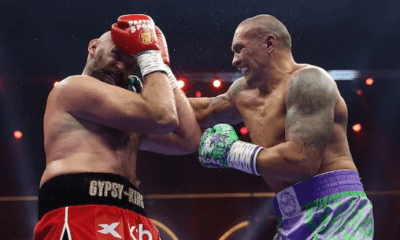
 Featured Articles2 weeks ago
Featured Articles2 weeks agoBoxing Notes and Nuggets from Thomas Hauser
-
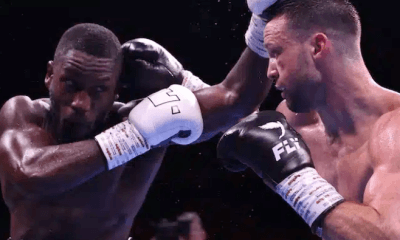
 Featured Articles2 weeks ago
Featured Articles2 weeks agoEkow Essuman Upsets Josh Taylor and Moses Itauma Blasts Out Mike Balogun in Glasgow
-
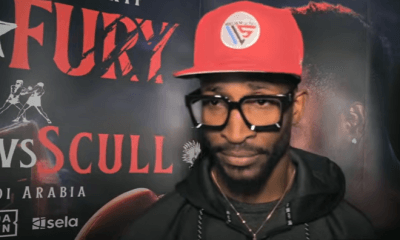
 Featured Articles4 weeks ago
Featured Articles4 weeks agoArne’s Almanac: The Good, the Bad, and the (Mostly) Ugly; a Weekend Boxing Recap and More
-
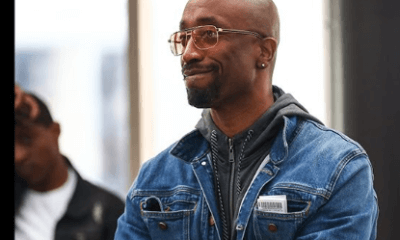
 Featured Articles4 weeks ago
Featured Articles4 weeks ago“Breadman” Edwards: An Unlikely Boxing Coach with a Panoramic View of the Sport
-

 Featured Articles4 weeks ago
Featured Articles4 weeks agoAvila Perspective, Chap. 326: Top Rank and San Diego Smoke
-
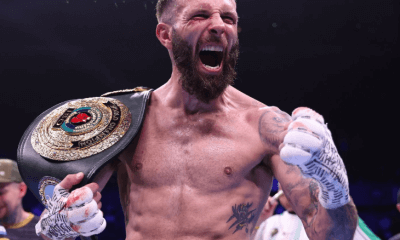
 Featured Articles4 weeks ago
Featured Articles4 weeks agoLate Bloomer Anthony Cacace TKOs Hometown Favorite Leigh Wood in Nottingham
-
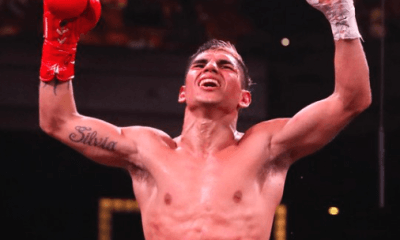
 Featured Articles3 weeks ago
Featured Articles3 weeks agoArgentina’s Fernando Martinez Wins His Rematch with Kazuto Ioka

















